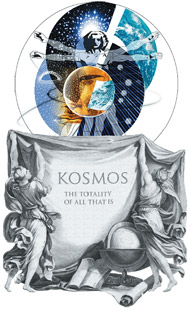Charting a new future demands a new vocabulary. Over the years, we’ve adopted many useful terms into our perpetually evolving EnlightenNext lexicon. So we decided to create this section in order to share key concepts that we find illuminating, clarifying, and useful in the quest to define the contours of a new evolutionary worldview.
To kick things off, we thought we’d start with one of the words in this section’s title and explain why we often spell it with a “K”:
Of or relating to the Kosmos—the multidimensional evolving Totality of existence, encompassing not only the physical but the biological, emotional, mental, psychic, and spiritual domains.

“The Cosmos is all that is or ever was or ever will be.” Thus began the famed astronomer Carl Sagan’s majestic PBS television series, Cosmos. The epic grandeur of Sagan’s Cosmos—suffused with “billions upon billions” of planets, stars, and galaxies—was truly awe-inspiring, captivating the imagination of viewers across America when it debuted in the fall of 1980. However, despite the almost sacred reverence for existence that permeated the series, some viewers still took issue with its strictly scientific bias, finding little room for God or the transcendent in Sagan’s naturalistic worldview. “Religion, especially,” complained critic John J. O’Connor in his review of Cosmos for The New York Times, “is characterized as being opposed to enlightened progress.”
Fifteen years later, in 1995, the American philosopher Ken Wilber issued an eight-hundred-page response to concerns such as these. Titled Sex, Ecology, Spirituality: The Spirit of Evolution, Wilber’s grand tome argued for a more holistic, integral conception of the universe—one that would fully honor the profound revelations of science and religion alike. He called this new vision “the Kosmos” (retaining the “K” from the Greek). So when we use the term “Kosmos”in this magazine, it’s not only to affirm our appreciation for Sagan’s extraordinary universe but also to restore the spiritual depth, subjective richness, and transcendent mysticism to reality that the ancient Greek philosophers, who coined the word, duly acknowledged and revered.




